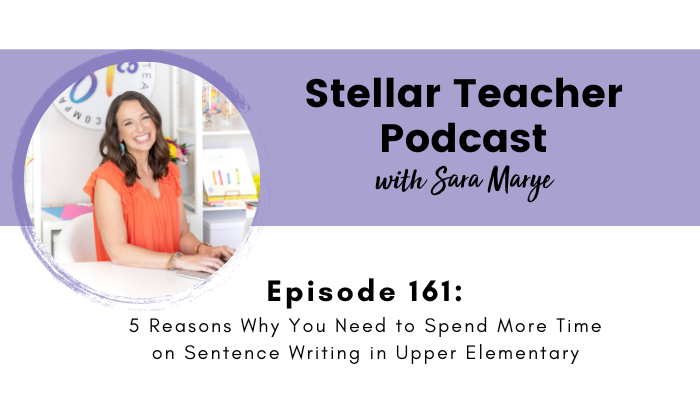
Click play below to hear 5 reasons to spend more time on sentence writing:
When students are in upper elementary, we often assume that they’re ready for more complex literacy skills, and therefore, we have higher expectations of them. However, that theory is completely false. I know when I was in the classroom, I thought that having my students write 5 paragraph essays was a sign they were excelling in writing.
But what my students really needed was more foundational work. Today’s episode is the first of a four-week series on sentences, where I’m sharing 5 reasons why spending more time on sentence writing benefits your students.
Even though sentences are a huge part of our literacy instruction, we rarely spend any time explicitly teaching them. However, when we put an emphasis on sentence-level instruction, it impacts all areas of literacy. Additionally, putting a focus on sentence writing benefits all students, for it gives students time to effectively communicate and an opportunity to vary their sentence structure and become expert writers.
Sentences truly are the key to understanding all other literacy concepts, for they affect a student’s reading comprehension and communication skills. Therefore, teachers, especially those in upper elementary, need to focus on their sentence-level instruction and activities. By doing so, your students will develop the necessary foundational skills to be successful writers with strong, detailed sentences.
In this episode on sentence writing, I share:
- 5 reasons you should spend time focusing on sentence writing instruction
- How sentences impact other areas of literacy
- Why sentence-level work benefits all students
- A preview of what’s to come in the next three weeks of this series on sentences
Resources:
- Sentence Writing Routine Resource: Free Sample
- Sentence Writing Routine Resource: TPT Store
- Sign up for my Private Podcast: Confident Writer Systems Series
- Check out the Stellar Literacy Collective Membership
- If you’re enjoying this podcast, please leave a review on Apple Podcasts!
Related episodes and blog posts:
- Episode 159, Avoid These Things During Grammar Instruction & See Students’ Writing Improve!
- Episode 139, Practice Sentence Deconstruction [Small Steps to S.O.R. Part 2]
- Episode 131, The #1 Mistake Upper Elementary Writing Teachers Make
- Episode 101, A Literacy Routine for Building Students’ Sentence Structure Skills
Connect with me:
- Join my newsletter
- Shop my TPT store here
- Instagram: @thestellarteachercompany
More About Stellar Teacher Podcast:
Welcome to the Stellar Teacher Podcast! We believe teaching literacy is a skill. It takes a lot of time, practice, and effort to be good at it. This podcast will show you how to level up your literacy instruction and make a massive impact with your students, all while having a little fun!
Your host, Sara Marye, is a literacy specialist passionate about helping elementary teachers around the world pass on their love of reading to their students. She has over a decade of experience working as a classroom teacher and school administrator. Sara has made it her mission to create high-quality no-fluff resources and lesson ideas that are both meaningful and engaging for young readers.
Each week, Sara and her guests will share their knowledge, tips, and tricks so that you can feel confident in your ability to transform your students into life-long readers.
Tune in on your favorite podcast platform: Apple, Google, Amazon, Spotify, Castbox, and more! If you’re loving this podcast, please rate, review, and follow!
Podcast (stellar-teacher-podcast): Play in new window | Download
Hey, there, welcome back to another episode. I am so glad you are tuning in because today, we are beginning a four week series about a super small literacy topic. Yet this one thing has such a huge impact on your students reading and writing success.
It’s something that we rarely spend enough time explicitly teaching and practicing. At least I know I didn’t give it the proper airtime that it deserved in my classroom. Yet it is something that is connected to everything we read and write. Any guesses on what it is?
It’s the sentence. We’re going to be talking all about sentences here on the podcast for the next four weeks. And that’s because sentences are such an important part of our literacy instruction. And we really want to make sure that we are spending enough time helping all of our students strengthen their sentence writing skills.
Because here’s the thing. Having strong sentence writing skills isn’t just something we want to focus on with our struggling readers and writers. It’s something we want to focus on with all students.
So like I said, for the next four weeks, we are really going to dig deep into all things sentences. In this episode, today, I’m going to be sharing five reasons why I think you need to spend more time focusing on sentence work in your upper elementary classroom. And then next week, I’m going to be sharing three really simple strategies that you can use to help your students expand their sentences, and make them more detailed and more robust. It’s going to be a very practical episode.
And then the week of October 16, I’m going to be talking all about what sentence deconstruction is and how to teach it. And then in the last episode of this four part series, I’m going to be sharing seven sneaky ways you can find more time to focus on sentence level work and your classroom. Because I know that even if you know that sentence work is important, it’s still hard to find time to prioritize it. But like I said, I’ve got some great tips to share with you and that specific episode.
So to kick off the series, let’s start with talking about five reasons why we need to spend more time focusing on sentence level writing in upper elementary. And let me start by explaining that sentence level writing or sentence level instruction is simply writing that really focuses on improving the sentence. The end goal is to write a strong, detailed, complete sentence.
Now I know in upper elementary, when you guys are writing paragraphs and essays and summaries and reading responses, your students are writing sentences. But we want to make sure that we are actually making the sentence the end goal and that is the focus of our instruction.
So we want to make sure that we are giving students strategies that are going to improve their sentences. And we also want to give them time to actually practice writing at the sentence level. So it’s easy enough for me to say that sentences and spending time focusing on sentences is really important. But let me give you five reasons why this is something that we really want to prioritize in upper elementary.
The first reason is that sentence level instruction is going to improve your student’s writing. And if you think about it, sentences are the foundation for all writing. So whether students are writing a paragraph or an essay, they really need to have strong sentence writing skills if they are going to be successful writers.
And oftentimes, the problem in upper elementary is that we assume that our students are going to come to us with decent sentence writing skills. So rather than spending time focusing on sentence level writing, we try to help students develop their Paragraph Writing skills or their essay writing skills.
But I’ve mentioned this before, you know, when we focus on essay writing, it’s not going to help students improve their sentence writing. If a student cannot write a complete sentence, if they struggled to write detailed sentences, by focusing on essay writing, we’re not really fixing the root cause of you know what’s maybe causing them to struggle with writing.
Ultimately, students really need to have explicit instruction and practice with key sentence writing concepts with things like being able to write a variety of sentence types, being able to find and fix fragments, being able to add details to their sentences. And if they are going to be successful writers, they have to be able to write a strong sentence.
And I think here’s a really important thing to keep in mind that you don’t have to wait until 100% of your students are expert sentence writers before you begin to work on Paragraph Writing, and essay writing. You know, you can’t just abandon sentence writing work for these more complex tasks.
So basically, you know, when I say things like, we want to make sure we’re focusing on sentence level writing in upper elementary. That’s not to say that we can’t also at the same time, focus on Paragraph Writing and essay writing, we want to do the same things at the same time simultaneously.
So while you’re maybe helping your students develop their paragraphs, and while you’re working through a five paragraph essay, you also want to make sure that you are spending time prioritizing sentence writing tasks, giving students opportunities to grow their sentence writing skills. And the next two episodes in this series are really going to go more in depth with how to help your students improve their sentences.
But we want to make sure that we are doing this in upper elementary. So focusing on sentence level writing is going to improve student’s overall writing.
The second reason why sentence level instruction is so important, because it also improves reading comprehension. Now, just like sentences are the foundation for writing, they’re also at the heart of what we read. Think about it, every story, every article, every chapter, and every paragraph in the texts that we read, is composed of sentences.
And so students really need to have a strong understanding of syntax and sentence structure, so that they can extract the meaning from the sentences that they’re reading in texts. And the really cool thing is, is that when you focus on sentence level work during writing, that investment of your time is also going to transfer over and help your students be able to better comprehend the sentences that they read.
You know, for example, let’s say that you’ve been working on teaching your students all about appositives in writing. And when you focus on that, in writing, your students are going to understand that appositive is a noun or a noun phrase that explains another noun in a sentence. So in addition to being able to use the positives and their writing, they’re also going to be much more likely to understand appositives when they are reading.
So if they came across a sentence like, “Miley, the team captain, scored the winning goal in the championship game.” Then they know that Miley is the team captain and she also scored the winning goal. And they understand that that phrase, the team captain, is a descriptor for Miley.
So the more students learn about writing effective sentences, the easier it’s going to be for them to comprehend the sentences they read, especially as those sentences become more complex, which we know happens starting in third grade.
So the third reason why sentence level writing is so important is because it is an actual manageable task for students and teachers. And think about it, how often do you get overwhelmed by the amount of writing that you have to grade, or the amount of feedback that you feel like you need to give your students on their writing?
I know, I spent so much time reading every single essay my students wrote, marking all of their mistakes, giving them feedback, meeting with them in conferences, and, you know, giving them seven or eight things that they need to work on. And it overwhelmed me to feel like I had to keep up with this grading and giving feedback. And I know it overwhelmed my students.
And in addition to the overwhelm that teachers can feel, by having to respond to all of students writing and read it and grade it, I bet you have students in your class that also get really overwhelmed anytime you assign them a long writing tasks. You know, maybe you’re starting to write those five paragraph essays and you’re telling your students I need you to write an expository or a narrative, you know, it needs to be five paragraphs, and you can just see the look of defeat on your students faces.
So we know that when people get overwhelmed, they tend to shut down and as a result, no action is taken. So ultimately, we don’t want our students to get overwhelmed with writing. And we as teachers also don’t want to be overwhelmed by the amount of writing that we have to grade or give feedback on.
And so we want to be really intentional about incorporating manageable tasks that are actually going to move the needle forward on student progress. And sentence writing practice is one of those very manageable tasks.
So consider assigning more sentence level assignments to your students. This means that your students output is literally just a single sentence. Or the goal of your lesson is just for students to write a single sentence. Maybe they’re going to write one sentence that summarizes the story. Maybe they’re gonna write one sentence to describe the main character. Maybe they’re going to only work on writing a topic sentence for their paragraph during your writing lesson.
A sentence is much less intimidating for students to write, compared to the overwhelm of a paragraph or essay. And if you just focus on one sentence at a time, eventually your students will build up to being able to write that paragraph or essay.
And here’s the other thing is you can actually gain a lot of information from a single sentence, and it’s going to be a lot easier for you to grade as well. So in addition to being more intentional about assigning, you know, just a single sentence for your students also consider only grading or giving feedback on one sentence and students writing.
You know, maybe when you’re reading their, you know, their paragraphs or their essays, you know, tell them even though you wrote this entire paragraph, I’m only going to give you feedback on your topic sentence. And that’s going to help you know exactly what you need to do the next time. You know, or maybe tell them I want you to, you know, they wrote an entire essay, encourage your students to pick out three sentences that they want you to give them feedback on.
Because in a single sentence, you can figure out do they have their capitalization punctuation rules, do they put subject verb agreement, you know, how’s their overall spelling, how’s their sentence structure, you don’t need to read an entire essay to get that information, you can get a lot of that from a single sentence.
And I think when we shift our focus from, you know, paragraphs and essays to sentence level writing, we are focusing more on quality, over quantity. And I know that there is this pressure, especially in upper elementary that we feel that we need to have our students writing long, you know that if they produce an essay, then that’s a result that we’re actually teaching writing.
But you know, really try to give your students time and support and only have them focus on writing one really amazing sentence and just see what happens. You know, also, I think, if you know, if you’re realizing that your students struggle with writing, and you keep focusing on essays and paragraphs, and these longer writing tasks, and that’s not working, try something else.
So like I said, try focusing on more manageable tasks, just you know, sentence level writing a sentence is their output, and see how that makes both you and your students feel, I bet it’s gonna change your mind a little bit.
So the fourth reason why sentence level writing is so important is because it’s an effective vehicle for teaching grammar. And if you listen to one of my recent episodes, it was just episode number 159, then you heard me talk all about how grammar is really best taught in the context of actual writing. And sentence writing is one of the best vehicles to deliver your grammar instruction.
And pretty much whatever grammar skill you need to teach, that can be taught through sentence writing: capitalization, punctuation, subject verb agreement, subject and predicate types of phrases, complex sentences, compound sentences, all types of sentences. All of these grammar skills can be taught through sentence writing, you don’t need to have a worksheet or you know, any other specific lesson, you can literally have your students practice writing sentences, and model and show them how to apply these things to their writing.
So really, it’s a win win. Because when you focus on sentence writing, your students are improving their ability to write sentences, but they’re also learning about key grammar skills.
Also, I’ve mentioned this in the grammar episode, and I mentioned this before, but our sentence writing routine is a great way for you to focus both on sentence writing and on grammar. Because those different sentence level writing tasks just give you so many opportunities to hit on a lot of key grammar skills.
And if you have not grabbed a free sample of that sentence writing routine, definitely go grab that you can get that at stellarteacher.com/sentences. And like I said, it’s a really great routine that helps you focus on sentence level writing, but also opens up the conversation to focus on a lot of these key grammar skills as well.
Okay, the fifth reason why sentence level writing is important is because it benefits all students. Now, I bet you have students in your class right now that can’t write a complete sentence. And those students are going to benefit from you slowing down and spending more time teaching and talking about sentence writing.
And that’s because they need to be able to write a complete sentence if they want to have any hope of being an effective communicator, both in school and outside of school. And chances are if you have students who struggle to write a complete sentence, they are also struggling to understand those complex sentences that they see in their texts.
You know, they don’t necessarily understand how ideas can be strung together to form a complete thought in sentences, you know, they might not understand the relationship between different phrases and a sentence. And also is likely that some of your students who struggle with writing are also some of your students who struggle with reading.
So we want to make sure that we are slowing down and helping these students who struggle with reading and writing really develop strong sentence writing skills and improve their ability to effectively communicate through sentences.
But I bet you also have students in your class right now, that can write a complete sentence. And maybe you’re thinking, Okay, I understand how sentence writing is going to benefit students who can’t write. But I feel like it’s going to be a waste of time for my students who are already strong writers, if we slow down and focus on sentence writing.
But that might be where your understanding of sentence work might be slightly short sighted, because even our students who can already write a complete sentence, they can benefit from sentence level work. And when we slow down our instruction, and really spend more time focusing on sentences, even our advanced students benefit.
You know, our students start to become more aware of different sentence structures they can use in their writing. So their writing is going to be more varied and more interesting to read. You know, our students start to realize that there is usually more than one way that they can organize ideas in a sentence. And they start to explore rewriting sentences and multiple ways.
They start to understand that you can combine two sentences into a single sentence, and you can take a longer complex sentence, and you can separate it into two shorter sentences, you know, they start to realize that there’s a variety of phrases that can be added to the sentences to give more detail to the reader. And they realized that there is an unlimited number of connective and transitional phrases that they can add to improve their writing.
So basically, when we give our students who can write a complete sentence, more time to focus on sentence level writing, we are really giving them the time and the opportunity to become expert writers, which is going to have a huge impact on their ability to effectively communicate later in life. So sentence level work benefits all students, it benefits your students who struggle with writing, and it benefits your students who can already write a complete sentence.
Okay, so I hope this episode has convinced you to spend more time focusing on just sentences. Why? Because when we focus on sentence level activities and sentence level instruction, our students writing is going to improve, their reading comprehension is going to improve, sentences are a manageable task for both students to practice and teachers to assess, sentences are also an easy and effective vehicle to teach grammar, and really all students are going to benefit from sentence work and practice in your classroom.
So now that you are feeling convinced, I hope that you tune in next Monday, which is when I’ll be sharing three strategies that you can use to really help your students expand their sentences and add more details. Like I said, it’s going to be a very practical episode and you’ll walk away with things you can start doing that day. So until then, have a great week.

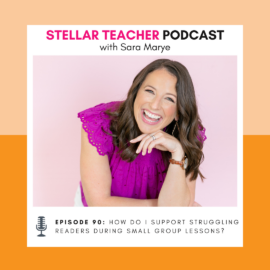
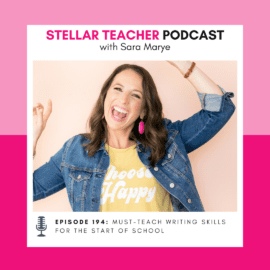
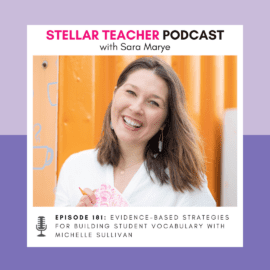
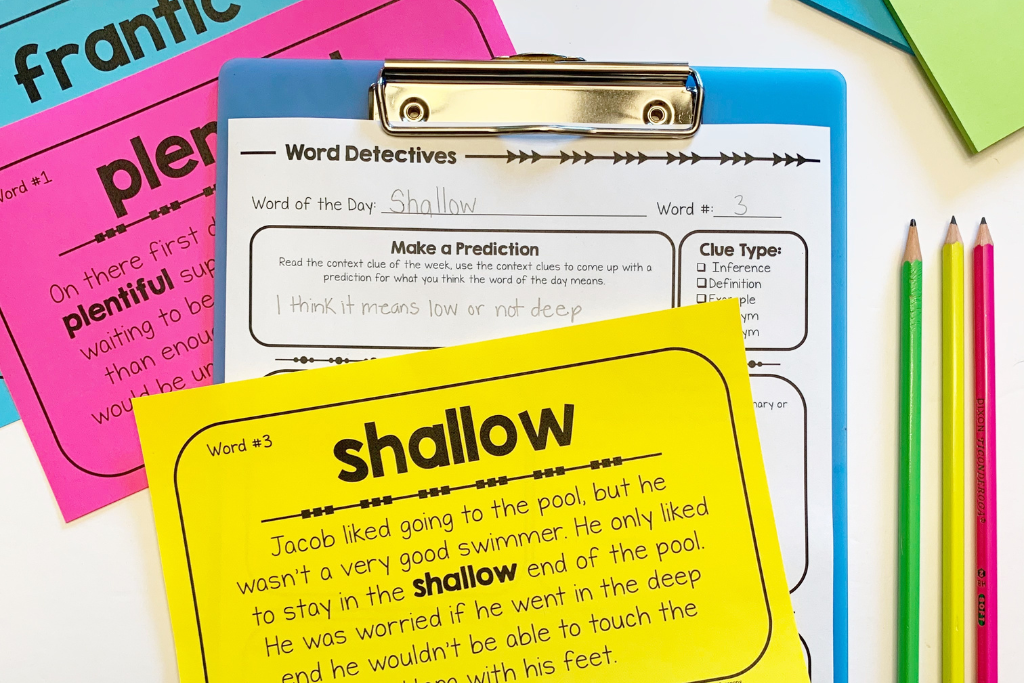

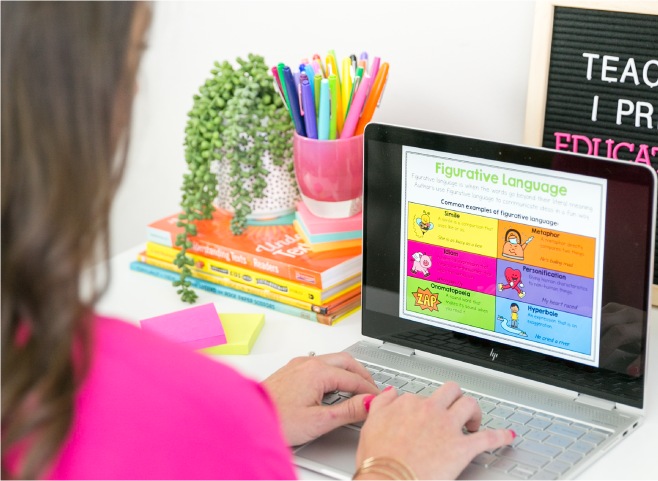

Leave a Comment
You must be logged in to post a comment.